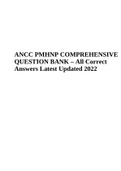ANCC PMHNP COMPREHENSIVE QUESTION BANK – All Correct Answers Latest Updated 2022 PMHNP Comprehensive AIMS Answer- Abnormal Involuntary Movement Scale for 8 and older 12 item tool to assess symptoms of tardive dyskinesia for patients taking antipsychotics Rating 0-4, >2 to diagnose TD and reduce dose BARS Answer- Barnes Akathisia Rating Scale for 8 and older 4 item tool to assess objective and subjective symptoms of akathisia with antipsychotics and/or SSRIs CRS-R Answer- Connors Rating Scales - Revised for 3-17 ADHD Parent (80 items) and Teacher Scales (59 items) Low T-score of 61= mildly atypical; >70 = markedly atypical Subscales for Oppositional Behaviors, Cognitive Problems, Hyperactivity, ADHD Index, Anxious-Shy, Perfectionism, Social Problems, DSM-IV Subscales and Connors' Global Index Vanderbilt ADHD Parent and Teacher Answer- 55 parent, 43 teacher items for 6-12 Initial assessment rates symptoms and impairment in academic and behavioral performance ASRS-1 Answer- Adult ADHD Self-Report Scale, 16 and older Two-part Screening Part A: 6 questions, 4 symptoms suggest ADHD Part B: 12 questions to clarify and quantify AUDIT-C Answer- Alcohol Use Disorders Identification Test - Consumption, > 13 Documents use and frequency in prior year 0-4, F >3 = positive, M >4 = positive, >8 = hazardous drinking CAGE-AID Answer- IDs problem drinking or druging, 13 and older (C=cut down, A=annoy, G=guilty, E=Eye-opener, AID=altered to include drugs CRAFFT Answer- 6-item screen for alcohol or drugs in adolescents, 14-18 (C=car, R=relax, A=alone, F=forget, F= family or friends, T= trouble) BAI Answer- Beck Anxiety Inventory, 17 and older Assesses 21 symptoms of anxiety, 0-36 scores HAM-A Answer- Hamilton Anxiety Scale, most commonly used 14 domains, 14=mild, 18-24= moderate, 25-30=severe LSAS-CA Answer- Liebowitz Social Anxiety Scale-Child/Adolescent Version, 7 and older 24 items, social and performance 55-65=moderate social phobia, 65-80=marked, 80-95=severe, >95=very severe MMSE Answer- Mini Mental Status Exam 30 items, 24-30= no cognitive impairment; 18-23=mild cognitive impairment; 0-17= severe cognitive impairment MOCA Answer- Montreal Cognitive Assessment >26=normal, add point for <12th grade education SPMSQ Answer- Short Portable Mental Status Questionnaire 10 items, more than 3 incorrect indicates dementia BDI-2 Answer- Beck Depression inventory, 13 and older presence and impact of depressive symptoms 21 items, <10=normal; 11-17=mild depression; 18-23=moderate; 24+=severe CCSD Answer- Cornell Scale for Depression in Dementia 19 items, <6=no significant depression; 8-17=probable major depression; >18=definite depression MDQ Answer- Mood Disorder Questionnaire Screen for mania or hypomania positive if 7 or more of 13 items in question #1 present and #2 is yes and #3 gets moderate or serious problem response YMRS Answer- Young Mania Rating Scale, 11 items (adult) Range 0-60; adults with 12 or more=mania CY-BOCS Answer- ... YBOCS Answer- Yale-Brown Obsessive Compulsive Scale 10 items; age 14 and older gold standard for OC symptoms score indicates level of severity BPRS Answer- Brief Psychiatric Rating Scale, 18 and older Assesses psychopathology (+, - and affective) with schizophrenia, not for screening or DX PANSS Answer- Positive and Negative Syndrome Scale, 18 and older measures changes in symptom intensity in psychosis and schizophrenia Gold standard in studies of treatment efficacy SPS Answer- Suicide Probability Scale, 13 and older Rapid measure of suicide risk higher score indicates greater risk CIWA-Ar Answer- Clinical Institute Withdrawal Assessment of Alcohol Scale, Revised 9 item symptom rating scale, max score 67; <10 does not warrant intervention COWS Answer- Clinical Opiate Withdrawal Scale Quantifies severity of withdrawal syndrome, guides dosing, monitors over time Used for induction of Suboxone 5-12=mild; 13-24= moderate; 25-36=mod to severe; >36=severe T4, FREE THYROXINE Answer- 0.8-2.8 Increased In Graves Decreased In Hypothyroidism TSH Answer- 2- 10 mu/l Normal values can range from 0.4 - 4.0 mIU/L (milli-international units per liter), Calcium, Ca++ Answer- 8.8-10.5 <7.0, tetany >11.0, hyperparathyroidism >13.5, hypercalcemic coma, metastatic cancer Sodium, Na+ Answer- 135-148 mEq/L hypernatremia Answer- dehydration hypovolemia diabetes insipidus eating too much salt gastroenteritis drugs such as adrenocorticosteroids, methyldopa, hydrazine, cough meds hyponatremia Answer- drugs such as lithium, vasopressin, diuretics addisons renal disorder gi fluid loss Magnesium, Mg Answer- 1.3 - 2.1 mEq/L lithium can increase hypomagnesemia Answer- depression, confusion, irritability,nystagmus, tetany, convulsions, ataxia, increased reflexes, muscle weakness hypermagnesemia Answer- N/V, respiratory depression, hypotension, depressed skeletal muscle contraction and nerve function, bradycardia




